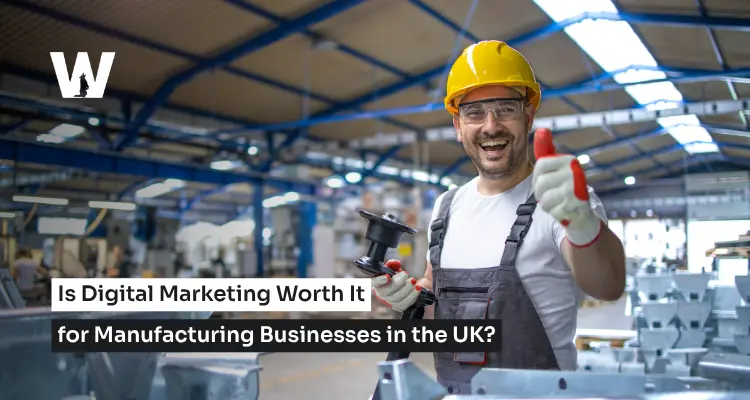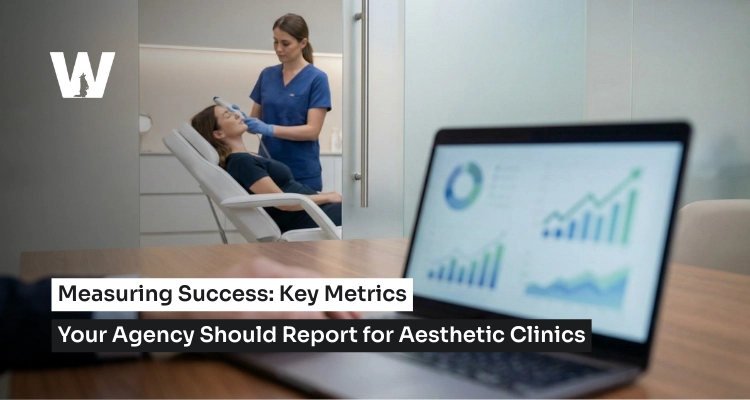Wraps up in 8 Minutes
Absolutely yes. UK manufacturing businesses investing in digital marketing see strong ROI within their first year, with some achieving exceptional returns on their digital spend.
The UK's manufacturing sector contributes billions annually to the country's economy. Yet many manufacturers still rely on outdated marketing methods that limit their growth potential in an increasingly digital marketplace.
This comprehensive guide examines real data, case studies, and proven strategies to help you determine if digital marketing deserves a place in your manufacturing business budget. By the end of this article, you'll understand exactly how digital marketing can impact your bottom line and have a clear roadmap for getting started.
The UK's Manufacturing Sector: What's Happening Right Now?
Traditional Marketing Challenges for UK Manufacturers
The UK's manufacturing landscape is more competitive than ever. With thousands of manufacturing businesses operating across Britain, standing out requires more than word-of-mouth referrals.
Traditional marketing challenges facing manufacturers include:
Limited regional reach beyond existing networks. Trade shows and print advertising only reach attendees or subscribers, missing potential clients actively searching for your services online.
High costs with unclear returns. A single trade show can cost substantial amounts including stand rental, materials, and staff time. Yet measuring actual leads and conversions remains nearly impossible.
Difficulty competing with international manufacturers. Overseas competitors often have larger marketing budgets and more sophisticated digital presence, making it harder for UK-based firms to win new business.
Post-Pandemic Digital Adoption Changes
The pandemic accelerated digital adoption across UK manufacturing by several years. The majority of B2B buyers now complete their research online before ever speaking to a salesperson.
This shift means your potential clients are searching for manufacturing solutions on Google, LinkedIn, and industry websites. If your business isn't visible in these spaces, you're missing qualified leads every day.
Post-Brexit challenges have also pushed manufacturers to seek new markets and suppliers, with the vast majority using digital channels to research potential partners.
What Does the Data Say About Digital Marketing ROI for Manufacturers?
Industry Benchmarks You Need to Know
Manufacturing businesses investing in digital marketing consistently outperform those relying solely on traditional methods. Here's what the numbers reveal:
Average ROI for manufacturing digital marketing shows strong returns within the first year to eighteen months of consistent investment.
Lead generation costs drop significantly. Digital channels generate leads at much lower costs compared to trade shows and print advertising.
Conversion rates vary dramatically by channel:
- SEO-generated leads show excellent conversion rates
- Social media leads (LinkedIn) provide quality prospects
- PPC advertising delivers consistent conversions
- Email marketing maintains steady performance
UK-Specific Performance Metrics
UK manufacturers benefit from unique advantages in digital marketing:
Regional search dominance is achievable. Manufacturing searches with regional modifiers like "West Midlands," "Yorkshire," or "Scotland" have considerably less competition than national terms, making it easier to rank prominently.
LinkedIn engagement rates are notably higher for UK-based manufacturing content compared to global averages, likely due to the country's concentration of decision-makers and strong B2B networking culture.
Website traffic growth patterns show UK manufacturers achieving substantial traffic increases within their first year of focused SEO efforts across different regions.
Real ROI Calculations for Digital Marketing Investment
Let's examine realistic returns for a typical digital marketing budget:
SEO Investment:
- Expected leads: Substantial volume of qualified leads
- Conversion rate: Strong performance
- New customers: Significant number of new clients
- Revenue generated: Multiple times the investment
PPC Investment:
- Expected leads: Consistent qualified lead flow
- Conversion rate: Reliable performance
- New customers: Steady new client acquisition
- Revenue generated: Strong returns on ad spend
Content Marketing & Social:
- Long-term brand building and lead nurturing
- Supporting conversions from other channels
- Significant contribution to influenced revenue
Total expected return represents exceptional ROI on digital marketing investment.
Which Digital Marketing Channels Actually Work for Manufacturers?
1. Search Engine Optimisation (SEO)
Manufacturing SEO requires patience and expertise, but delivers exceptional long-term results. Success depends on focusing on technical keywords your ideal clients actually search for, not just industry jargon.
Local SEO proves particularly effective for UK manufacturers. Technical manufacturing terms with regional modifiers receive substantial monthly search volume across different UK regions.
Technical content marketing builds authority and trust. Manufacturing buyers need detailed information about capabilities, certifications, and processes before making contact.
Expected timeline for SEO results:
- Month 1-3: Technical audit and optimisation
- Month 4-6: Content creation and initial ranking improvements
- Month 7-12: Significant traffic and lead generation increases
- Month 12+: Sustained growth and market dominance
Professional SEO services like those offered by Wolfable ensure your technical content ranks for the terms your prospects use, creating sustainable competitive advantages.
2. LinkedIn and B2B Social Media Marketing
LinkedIn remains the most effective social platform for manufacturing businesses. Decision-makers in manufacturing companies are significantly more likely to engage with content on LinkedIn than any other platform.
Effective LinkedIn strategies include:
- Thought leadership content showcasing expertise in manufacturing processes, industry trends, and technical innovations.
- Industry group engagement allows you to connect directly with potential clients discussing their challenges and requirements.
- Video content demonstrating complex manufacturing processes receives considerably more engagement than text-only posts.
- LinkedIn advertising targets decision-makers based on company size, industry, and job title with remarkable precision.
3. Pay-Per-Click (PPC) Advertising
PPC works brilliantly for manufacturing when properly structured. The key lies in understanding that manufacturing sales cycles typically span extended periods and designing campaigns accordingly.
- Google Ads for high-intent searches like "custom fabrication UK" or "ISO certified manufacturers Britain" capture prospects actively seeking solutions.
- Remarketing strategies keep your business visible throughout extended decision-making processes. Prospects researching manufacturing solutions often visit multiple websites before making contact.
- Bing Ads shouldn't be overlooked in B2B manufacturing. Many corporate networks default to Bing, and competition is typically much lower than Google.
4. Content Marketing and Email Nurturing
Content marketing builds the trust essential for high-value manufacturing deals. Technical buyers need confidence in your capabilities before investing in your services.
Effective content types include:
- Case studies demonstrating problem-solving for clients in similar industries or with comparable challenges.
- Technical guides and whitepapers that showcase expertise while providing genuine value to prospects.
- Video content including virtual facility tours helps prospects understand your capabilities and quality standards.
- Email nurturing sequences maintain contact with prospects throughout extended sales cycles, providing relevant information at each stage.
5. Website Optimisation
Your website often provides the first impression potential clients have of your manufacturing business. In B2B manufacturing, this impression significantly impacts whether prospects choose to make contact.
- Mobile-first design is non-negotiable. The majority of B2B research now happens on mobile devices, including initial searches and specification reviews.
- Fast loading speeds matter more in manufacturing than many other industries. Technical specification sheets, CAD files, and detailed product information must load quickly.
- Clear calls-to-action should guide prospects toward quote requests, facility tours, or capability discussions.
- CRM integration ensures no leads slip through cracks during extended sales cycles.
Professional WordPress development services ensure your manufacturing website converts visitors into qualified leads.
Common Digital Marketing Failures in Manufacturing
The Top 5 Digital Marketing Mistakes Manufacturers Make
- Expecting immediate results is the most common mistake. Manufacturing sales cycles require extended periods, and digital marketing needs time to build momentum.
- Generic messaging fails to connect with technical audiences. Manufacturing buyers need specific details about capabilities, certifications, and processes.
- Neglecting mobile optimisation ignores the reality that the majority of B2B research now happens on mobile devices, including initial supplier searches.
- Inconsistent branding across channels undermines professionalism. In high-value manufacturing deals, consistent professional presentation influences purchasing decisions.
- Poor lead nurturing systems waste the leads digital marketing generates. Without systematic follow-up, prospects choose competitors who maintain better communication.
How to Set Realistic Expectations for Digital Marketing
SEO requires extended commitments before significant results appear. Technical content and authority building take time in competitive manufacturing markets.
PPC campaigns need extended testing periods to optimise targeting, messaging, and conversion paths for manufacturing audiences.
Content marketing delivers compound returns over extended periods. Early results may seem modest, but sustained effort creates significant long-term advantages.
Social media success requires consistency over many months, not weeks. Building thought leadership and industry relationships takes sustained effort.
Understanding these timelines prevents premature abandonment of strategies that would eventually deliver strong returns.
Ready to Invest in Digital Marketing? Your Step-by-Step Action Plan
Step 1: Audit Your Current Digital Position
Website performance analysis reveals technical issues limiting lead generation. Many manufacturing websites load slowly or provide poor mobile experiences.
Competitor digital presence research identifies opportunities and benchmarks. Understanding what successful competitors do digitally informs strategy development.
Current lead generation assessment establishes baseline metrics. Knowing current lead volumes and costs enables accurate ROI measurement.
Step 2: Set Realistic Budget and Timeline Expectations
Recommended budget allocation for manufacturers:
- SEO: Largest portion of digital budget (long-term growth)
- PPC: Substantial allocation (immediate visibility)
- Content marketing: Meaningful investment (authority building)
- Social media: Supporting allocation (relationship building)
Expected timeline for different outcomes:
- Lead generation improvements: Several months
- Significant traffic increases: Extended period
- Market leadership positioning: Long-term commitment
Step 3: Choose Your First Digital Marketing Channel
SEO for long-term growth suits manufacturers planning sustained digital investment. Results compound over time, creating lasting competitive advantages.
PPC for immediate visibility works when you need leads quickly or want to test market demand for new services.
LinkedIn for relationship building proves ideal for manufacturers selling complex solutions requiring trust and credibility.
Most successful manufacturers eventually use multiple channels, but starting with one allows proper focus and budget allocation.
Step 4: Measure and Optimise Performance
Key metrics to track regularly:
- Website traffic from organic search
- Lead generation by channel
- Cost per lead by source
- Lead-to-customer conversion rates
- Revenue attribution to digital channels
Signs your digital marketing is working:
- Increasing organic search traffic
- More qualified enquiries through website forms
- Prospects mentioning they found you online
- Reduced cost per lead over time
- Growing social media engagement from target audience
Regular measurement and optimisation ensure continued improvement and maximum ROI from digital marketing investments.
The Verdict: Digital Marketing Delivers Measurable ROI for UK Manufacturers
Digital marketing is absolutely worth the investment for manufacturing businesses in the UK. The data overwhelmingly supports this conclusion.
Manufacturers investing strategically in digital marketing achieve strong ROI within reasonable timeframes. More importantly, they build sustainable competitive advantages that compound over time.
Success requires strategic approach, realistic timelines, and consistent execution. The manufacturers who succeed understand that digital marketing is a long-term investment, not a quick fix.
Ready to explore how digital marketing can transform your manufacturing business? Wolfable specialises in helping UK manufacturers develop and execute digital marketing strategies that deliver measurable results. Our team understands the unique challenges and opportunities in manufacturing marketing. Contact Wolfable now to create your personalised digital marketing roadmap.







